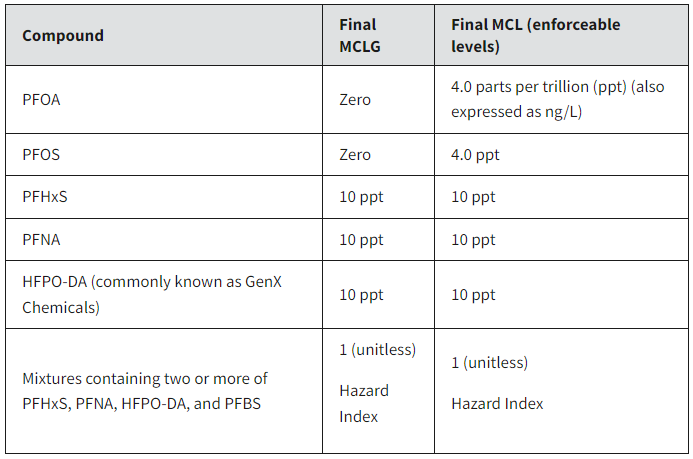The Environmental Protection Agency (EPA) has finalized rules on PFAS (Per- and polyfluoroalkyl substances) also known as “forever chemicals” in drinking water systems across the US.
EPA Administrator Michael Regan who previously served as head of North Carolina’s Department of Environmental Quality from 2017 until early 2021, announced the regulations at the P.O. Hoffer Water Plant in Fayetteville on Wednesday.
The new rules require public water utilities to monitor for six types of PFAS and limit maximum contaminant levels (MCL).
Final PFAS National Primary Drinking Water Regulation

Exposure to PFAS has been linked to serious health risks, including certain cancers, liver and heart damage in adults, and immune and developmental effects for infants and children.
“Today I’m proud to return to North Carolina to announce the first ever, nationwide, legally enforceable drinking water standard for PFAS,” Regan said, “this is the most significant action EPA has ever taken on PFAS.”
Regan noted the importance of these chemicals, but also the risks.
“These chemicals have a place and are important for certain industries and certain practices. There’s also no doubt that these chemicals entering our environment in an uncontrolled manner are harmful to our families, harmful to our communities, and harmful to our economy,” Regan said.
PFAS are a category of chemicals used since the 1940s to repel oil and water and resist heat, which makes them useful in everyday products such as nonstick cookware, stain resistant clothing, and firefighting foam.
13 months ago, Regan was in Wilmington at the campus of UNCW to announce the start of the rule-making process.
Southeastern North Carolina has been on the forefront of contaminated drinking water, since 2017 when it was reported that chemical company Chemours had been dumping GenX into the Cape Fear River for decades.
The Biden administration has allocated $1 billion to assist states in funding infrastructure upgrades to adhere to the new regulations. North Carolina is set to receive $29 million in grant funding to aid utilities in implementing testing and upgrading water treatment technology.
“You are going to hear a lot of talk about cost and it can’t be done and we shouldn’t do this,” Regan said, “Let me just tell you it can be done. It can be achieved using a range of technologies and approaches that many water systems are using today.”
The Cape Fear Public Utility Authority, which provides water to customers in New Hanover County, has already invested more than $40 million to install granular activated carbon filters to address PFAS.
More about the new rules can be found on the EPA’s website.